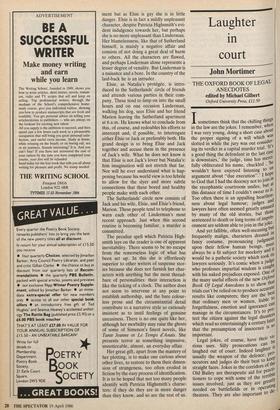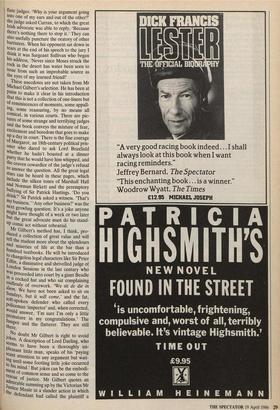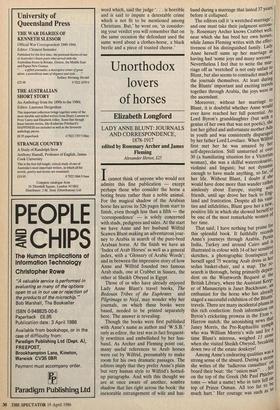Laughter in court
John Mortimer
THE OXFORD BOOK OF LEGAL ANECDOTES edited by Michael Gilbert
Oxford University Press, f12.50
Isometimes think that the chilling things in the law are the jokes. I remember, when I was very young, doing a short case about the proper signing of a will which was slotted in while the jury was out consider- ing its verdict in a capital murder trial. 'It s a good thing the defendant in the last ease is downstairs,' the judge, time has merci- fully obliterated his name, chuckled , 'lle wouldn't have enjoyed listening to an argument about "due execution".' I h°P.e to God that I had the decency not to join In the sycophantic courtroom smiles, but at this distance of time I couldn't swear to it. Too often there is an appalling heartless- ness about legal humour; judges allci, lawyers have often seemed greatly amuse' by many of the old stories, but those sentenced to death or long terms of imPos" onment are seldom able to join in the joke. And yet fallible, often well-meaning but frequently malign, characters dressed la fancy costume, pronouncing judgment, upon their fellow human beings, Illus.' always be a fit subject for mockery and .lt would be a pathetic society which took Its lawyers seriously. It's comic when a judEe, who professes impartial wisdom is caught with his naked prejudices exposed. One `31_, the many useful effects of the new Oxford Book Of Legal Anecdotes is to show that trials can't be relied on to produce accurate results like computers; they are the best that ordinary men or women, liable to forgetfulness, emotion and ignorance can manage in the circumstances. It's to pro- tect the citizen against the legal disasters which read so entertainingly a century later that the presumption of innocence is s° important. . Legal jokes, of course, have their va- rious uses. Silly prosecutions can °.' laughed out of court. Indeed laughter is usually the weapon of the defence; pro- secutors and judges do their best to keep straight faces. Jokes in the corridors of the Old Bailey are therapeutic aid for pra.et,1 tioners to cope with some of the terrible issues involved, just as they are greatlY needed on battlefields or in operating theatres. They are also important to de Hate judges. 'Why is your argument going Into one of my ears and out of the other?' the judge asked Curran, to which the great Irish advocate was able to reply, 'Because there's nothing there to stop it.' They can also usefully puncture the oratory of other barristers. When his opponent sat down in tears at the end of his speech to the jury I think it was Sargeant Sullivan who began his address, 'Never since Moses struck the rock in the desert has water been seen to issue from such an improbable source as the eyes of my learned friend!' These anecdotes are not taken from Mr Michael Gilbert's selection. He has been at pains to make it clear in his introduction that this is not a collection of one-liners but of reminiscences of moments, some appall- ing, some reassuring, by no means all comical, in various courts. There are pic- tures of some strange and terrifying judges and the book conveys the mixture of fear, excitement and boredom that goes to make UP a day in court. There is the fine courage of Margarot, an 18th-century political pris- oner who dared to ask Lord Braxfield whether he hadn't boasted at a dinner Party that he would have him whipped, and the craven cowardice of the judge's refusal to answer the question. All the great legal stars can be heard in these pages, which include the silken tones of Marshall Hall and Norman Birkett and the peremptory bullying of Sir Patrick Hastings. 'Do you drink?' Sir Patrick asked a witness. 'That's my business.' Any other business?' was the next growling question. It's a joke anyone might have thought of a week or two later but the great advocate must do his stand- up comic act without rehearsal.
Mr Gilbert's method has, I think, pro- duced a collection of great value and will tell the student more about the splendours and miseries of life at the bar than a hundred textbooks. He will be introduced to changeless legal characters like Sir Peter Edlin, a diminutive and shrivelled judge of London Sessions in the last century who was preceeded into court by a giant Beadle in a cocked hat and who sat complaining endlessly of overwork. 'We sit de die in chem. We have not been asked to sit on Sundays, but it will come,' and the fat, soft-spoken defender who called every Policeman 'inspector' and, when corrected, Would answer, 'I'm sure I'm only a little Premature in my congratulations.' The thssere.pot and the flatterer. They are still . No doubt Mr Gilbert is right to avoid Jokes. A description of Lord Darling, who seems to have been a thoroughly un- Pleasant little man, speaks of his 'paying scant attention to any argument but wait- ing until some footling little joke occurred tip his mind.' But jokes can be the embodi- ment of common sense and so come to the rescue of justice. Mr Gilbert quotes an admirable summing up by the Victorian Mr J.ustice Maule in a slander action in which the defendant had called the plaintiff a word which, said the judge `. . . is horrible and is said to impute a detestable crime which is not fit to be mentioned among Christians. But,' he went on, 'in consider- ing your verdict you will remember that on the same occasion the defendant used the same word about a clothes-horse, a black beetle and a piece of toasted cheese.'




















































 Previous page
Previous page